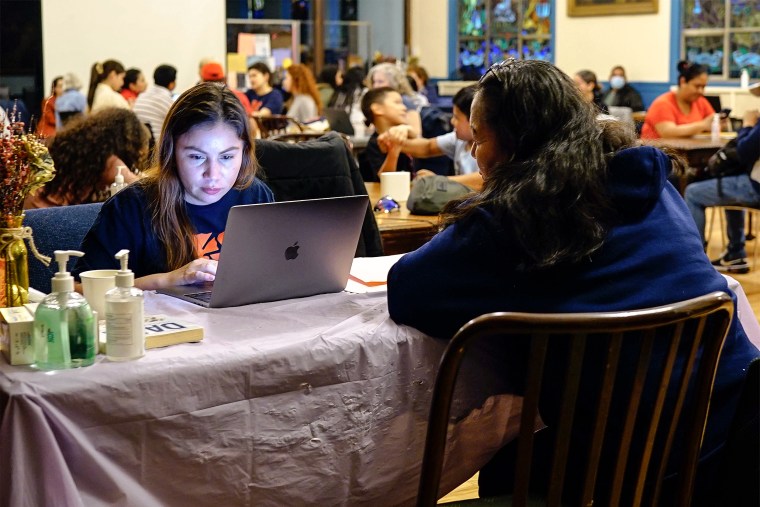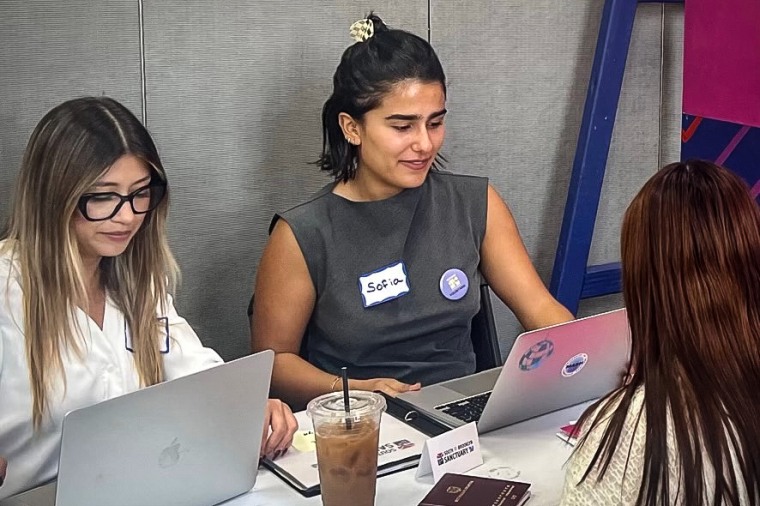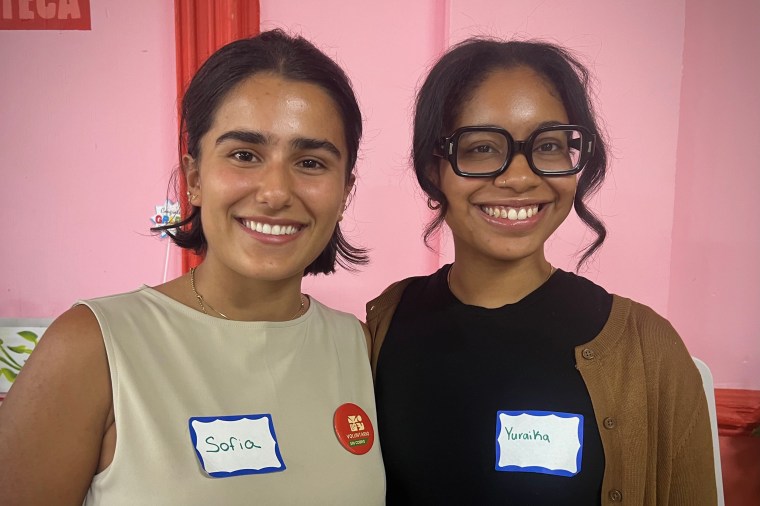On a Monday evening in January, South Brooklyn Sanctuary is crowded with dozens of volunteers, translators and migrants. The migrants ask a range of urgent questions — What does the incoming Trump administration mean for their pending asylum cases? How do you fight a deportation order? And, in the worst-case scenario, how do you prepare for family separation?
They’re fearful that as soon as President-elect Donald Trump is inaugurated on Monday, he will fulfill his campaign promise by ordering sweeping deportations across the country. The 210,000 undocumented people who have arrived in New York City since 2022 are also facing Mayor Eric Adams’ closure of the Floyd Bennett Field shelter, which houses 1,800 people, and his threats to roll back the city’s sanctuary policies by overriding the City Council’s opposition with an executive order. Incoming Trump administration officials and Adams have met to discuss deporting migrants who have committed crimes.
Emily Schectman, South Brooklyn Sanctuary director, said the organization is doing what it can to prepare for the uncertainty ahead. In recent weeks, it has had 150 new volunteer sign-ups and expects more after the inauguration. “We’re predicting that we’ll be doing a lot more deportation defense, ICE watch and anti-family separation work,” she said.
South Brooklyn Sanctuary is one of dozens of groups across the country that operates as a pro se community, teaching migrants to represent themselves “on their own behalf” in the legal system with volunteer support. The nonprofit has worked with over 5,000 migrants since opening in 2022 with a pool of over 100 trained and active volunteers. Last year alone, they helped 715 migrants file change-of-address forms so they don’t miss their court dates and risk deportation.

Once in office, Trump has promised to launch the “largest deportation program in American history,” send Congress a bill to ban sanctuary cities and request funding to hire and retain 10,000 new border agents. He has also said he will restrict federally funded benefits to only American citizens and reinstate and expand a travel ban targeting Muslim-majority countries. During a December interview with NBC’s “Meet the Press,” Trump claimed that he had “no choice” but to deport millions of people, and that “they’re costing us a fortune,” a claim that has been disputed by economists.
To prepare for the work ahead, South Brooklyn Sanctuary is fundraising for a full-time staff attorney and building a new program to help migrants file motions to reopen their asylum cases, which can combat removal orders. It’s also expanding into a new space this month, where it’ll train a new cohort of French and Arabic-speaking volunteers to accommodate the growing number of migrants from African countries.
“Our promise to the community is that we will remain knowledgeable and be prepared for any policy changes that will happen,” she said.
Training volunteers to support migrants
Emelis, who asked that her last name not be used for fear of deportation, said she left Venezuela after being targeted by the military for her high school protests against authoritarian President Nicolás Maduro.
The 26-year-old was almost out of time to apply for asylum when she attended South Brooklyn Sanctuary’s walk-in migration program at Good Shepherd Church in Bay Ridge; asylum applications need to be submitted within a year of an applicant’s arrival date in the United States. With the help of volunteers, she filled out her asylum and work permit forms just in time.
“I felt scared when I first arrived, but I received my work permit after only about a month,” Emelis said.
South Brooklyn Sanctuary was founded in the wake of Texas Gov. Greg Abbott’s decision to bus over 27,300 migrants to New York, citing the need for border security. Over 8 million migrants have crossed the U.S.-Mexico border since 2020 because of political suppression, gang violence, poverty and natural disasters, many settling in immigrant hubs in large cities that struggled to rapidly expand their safety net. As of 2024, border crossing numbers and new migrant arrivals to New York City and other major metropolitan hubs have declined.

In Brooklyn, Juan Carlos Ruiz, pastor of the Good Shepherd Church, and residents welcomed their new neighbors to a weekly walk-in program with immigration information, hot food and clothes. They soon realized what migrants also needed was knowledge about their rights.
At the time, legal clinics in New York City were overwhelmed by the influx of migrants struggling to find free legal representation. Other cities saw the same. The Migrant Solidarity Mutual Aid Network in Washington, D.C., and Mountain Dreamers in Frisco, Colorado, were just two of the many organizations formed in the absence of local government and nonprofit services helping migrants fill out asylum and employment authorization applications.
In New York, the city’s official asylum center places strict restrictions on who can schedule an asylum application appointment: Migrants must be in the city’s shelter system, eligible for work authorization and not have been in the country for more than 11 months. Meanwhile, many migrants who do get their day in immigration court are unprepared and often appear without legal representation. Nearly 44% of immigrants in New York state are battling their cases alone, Schectman said, and many don’t speak English, know their rights or have any legal training.
“In the absence of attorney capacity, we want a robust pro se community that can fill that justice gap,” Schectman said.
Preparing for the policy changes ahead
Maria Meneses, 45, is an asylum recipient herself and began volunteering with South Brooklyn Sanctuary last summer to share the advice that had once benefited her.
She sits with asylum applicants and tells them that she understands the traumas they carry with them. Meneses asks them for any proof of violence or abuse to make their case stronger. “I tell them, it might feel embarrassing, but it’s important to show what happened to you,” she said.
Meneses emphasized the importance of asylum-seekers naming the specific gang that threatened them and the towns it operates in. “Because of high corruption levels, many of these gangs are serious economic and political operations embedded in the government,” she said. “You can make the case that resisting them leads to government persecution.”

Meneses said that though her personal experience makes her an effective volunteer, it can take a toll on her, too. “These families put all their dreams into the asylum process,” she said. “They’re forced to recount the most terrible things that have happened to them and the reason why they left everything behind.”
But seeing South Brooklyn Sanctuary’s volunteer pool more than doubled during the past three months gives her hope. “It’s inspiring to see how New York City people show up to support their community,” she said.
For now, Emelis is building her life in New York. After she was granted a work permit in 2023, she found home attendant work with a temp agency. She’s able to spend time with her son and brothers after her evening shifts. “All I want is to give my son a better future here,” she said.
This article was published by NBC News on 2025-01-18 07:00:00
View Original Post











